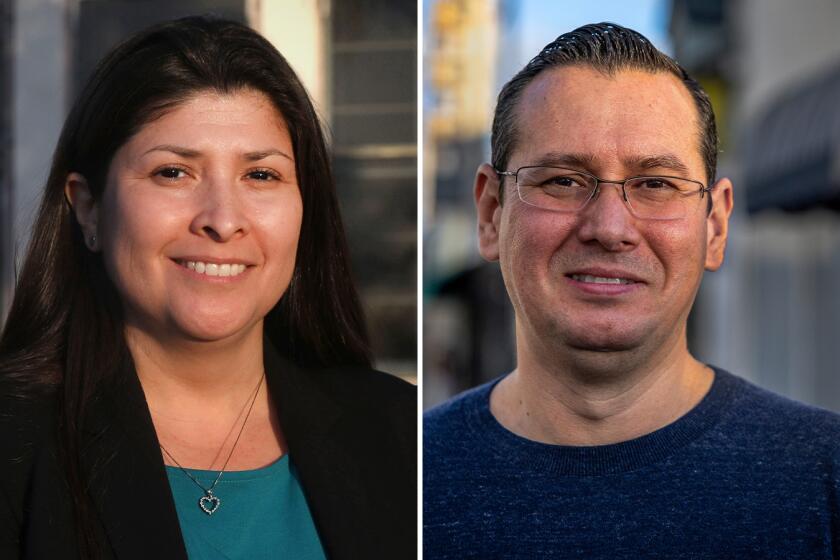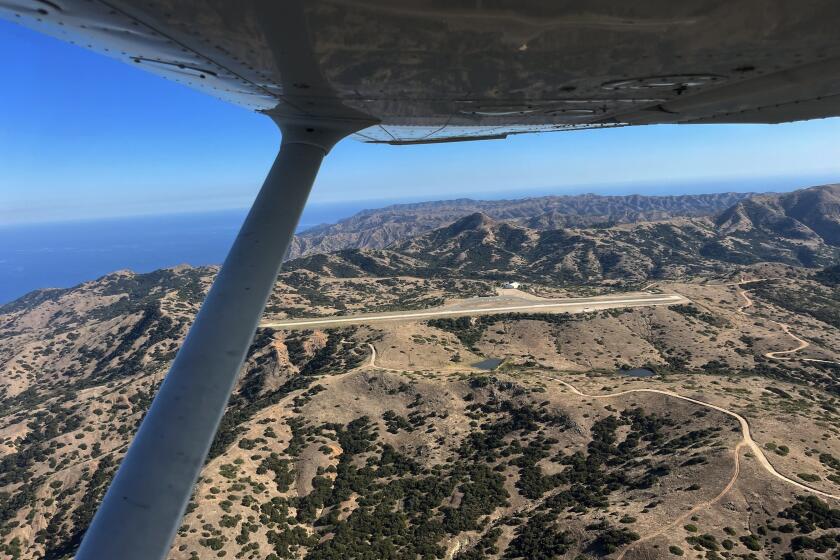Ex-members of L.A. sheriff’s alleged ‘secret police’ testify to oversight commission

For nearly five hours Friday, the Civilian Oversight Commission grilled two former members of a secretive unit within the L.A. County Sheriff’s Department accused of targeting former Sheriff Alex Villanueva’s foes.
The controversial — and now disbanded — Civil Rights and Public Integrity Detail was behind several of the high-profile investigations that dominated the headlines throughout Villanueva’s tenure, including those into the county watchdog, a county supervisor, a member of the oversight commission and a Los Angeles Times reporter.
Nearly two years after voters ousted Villanueva and elected Robert Luna as sheriff, questions have lingered about what the unit did and why it was created in the first place. This week’s special hearing sought answers from two of the unit’s central figures, Sgt. Max Fernandez and former homicide Det. Mark Lillienfeld.
Their testimony showed the unit had considered more cases than previously known, though officials apparently publicized only those relating to Villanueva’s sharpest critics. And in some instances, oversight officials said, the unit’s own members appeared to be above the law.
By the time the testimony wrapped up midafternoon, the commission’s typically reserved chair, Robert Bonner, had come to a stark conclusion about the “McCarthy-esque” unit: “It was set up to intimidate Alex Villanueva’s critics,” he said. “We must be sure this will never happen again.”
Villanueva has previously defended the unit, calling it a necessary tool for fighting corruption, and saying he recused himself from all decision-making that could create a conflict of interest. On Friday afternoon, he did not respond to an emailed request for comment.
Newly reported deputy subgroup logo features a skull with blood-red eyes, pierced by a jagged lightning bolt
The idea for the secretive squad at the center of Friday’s hearing stemmed from Villanueva’s 2018 campaign for sheriff, when he ran as a progressive reformer promising to address corruption in the department’s upper ranks. According to Lillienfeld, the unit formed about six months after Villanueva took office, though he said Villanueva first floated the idea to him two weeks before winning the election.
When The Times investigated the unit three years ago, there were nine known members. This week, Lillienfeld said the number fluctuated from two to 10. On paper, the unit’s detectives were scattered around the department on other assignments. One was supposed to be working patrol in Lancaster, and another was assigned to a gang crime unit.
In 2021, a memo by oversight commission member Sean Kennedy suggested asking state or federal officials to investigate the Villanueva administration’s “highly unusual announcements” about investigations that appeared to “suggest a pattern of targeting” those who criticized the department.
On Friday, Kennedy and other commissioners reiterated that sentiment — especially after Lillienfeld revealed the unit had examined “55 or 60” complaints.
“It’s interesting there were 55 or 60 cases,” Bonner said, “but the only ones that anybody’s ever heard of are the investigations of commissioner Patti Giggans, Supervisor [Sheila] Kuehl, Sachi Hamai the former [L.A. County] CEO, Inspector General Max Huntsman and Maya Lau, the Times reporter. Those are the only ones you’ve ever heard of — and there’s a reason for that.”
The Villanueva administration rehired Lillienfeld to join the unit in 2019, after he’d already retired from the department once and spent time working for the district attorney’s office.
While working for the D.A. in 2018, he was temporarily banned from all county lockups when he was caught on camera dressing as a deputy and sneaking into Men’s Central Jail to deliver a McDonald’s Egg McMuffin and a cup of coffee to an inmate.
On Friday, Lillienfeld offered a more detailed account of the unusual incident, saying it was all part of an investigation aimed at freeing a wrongfully convicted prisoner by finding evidence that would point to the real killer. As part of the inquiry, he began leaving food for an inmate informant to give to the suspected killer in order to win his trust. Eventually, Lillienfeld said, he planned to sneak in a tapped cellphone in hopes the real killer would confess.
But the operation, which Lillienfeld alleged was authorized by a court order, went south when another inmate discovered the food and jail officials caught on. Afterward, a commander who Lillienfeld said had it out for him decided to open an administrative inquiry and post fliers in all county jails warning deputies not to let him in.
“I’m the f— good guy here who got an innocent man out of prison,” Lillienfeld said Friday, adding that he was “very happy” with his salary at the Sheriff’s Department and didn’t need to smuggle contraband into jails on the side.
When Fernandez, the sergeant who also served in the unit, took the stand, he faced questions about his tattoos and whether they signified membership in any of the deputy gangs or subgroups that have bedeviled the Sheriff’s Department for half a century.
Fernandez said he wasn’t in any of the groups but testified that in the early 2000s he drew a logo for the Compton station’s Baker-to-Vegas relay race team. The intricate hand-drawn image featured a kneeling samurai-style warrior holding a double-headed ax and a shield emblazoned with a skull and the letters CPT.
After he left Compton station, Fernandez said, he heard some of the other deputies had made his art into a tattoo. One of the deputies with that tattoo is Lt. Larry Waldie, who has previously testified the image was associated with the Gladiators, a deputy group he said butted heads with the Compton station’s more notorious inked group known as the Executioners.
Though Fernandez said that he too had a tattoo of the warrior image, he said his was not numbered — as some deputy clique tattoos are — and that he does not consider himself a member of the Gladiators.
The wealthy operator of a cryptocurrency trading platform allegedly paid a number of L.A. County sheriff’s deputies to perform unlawful searches and arrests, according to a criminal complaint unsealed Thursday.
At one point, Kennedy more directly raised questions about Fernandez’s credibility and whether it would affect his suitability for a corruption squad. He brought up a criminal case from the mid-2000s in which an appellate court said Fernandez had given false testimony during a felony trial and that the error was “deliberate and no slip of the tongue.”
When asked about it, Fernandez pushed back.
“I’ve never lied on the stand,” he said. “That’s ridiculous, I’m an anti-corruption cop.”
One of the anti-corruption investigations he handled was the case against Kuehl and Giggans, both vocal critics of the Villanueva administration. The investigation centered on more than $800,000 worth of contracts Los Angeles County Metropolitan Transportation Authority awarded to Peace Over Violence, a nonprofit run by Giggans. The organization’s hotline for reporting sexual harassment on the transit system came under scrutiny after a whistleblower alleged Giggans was unfairly awarded the hotline contract as a quid pro quo for supporting Kuehl.
This year, state prosecutors formally rejected the case, saying they’d completed a “thorough and independent investigation.” But on Friday, Fernandez alleged state investigators previously told him prosecutors had never actually let them examine the evidence.
“The whole thing was covered up,” he said.
The Peace Over Violence investigation had also led to other allegations, including the claim — repeated frequently by Villanueva — that Huntsman was involved in tipping off Kuehl before the Sheriff’s Department searched her home.
In a statement Friday, Villanueva called Fernandez’s testimony “a damning indictment of the integrity of [state Atty. Gen. Rob] Bonta’s position on the Peace Over Violence investigation.”
“Fernandez confirmed what we knew, that Bonta assumed control of the public corruption investigation for the sole purpose of burying it, not to investigate it as he claimed,” he said. “This calls for a federal-level review of Bonta’s actions and public statements, which don’t appear to reconcile with the facts.”
During Friday’s hearing, Kennedy grilled Lillienfeld about why he didn’t investigate after learning Fernandez may have done something similar, allegedly telling the whistleblower’s husband about a search warrant in the case. Lillienfeld said he didn’t think Fernandez had leaked any information maliciously and pointed out that Fernandez didn’t tell the targets of any warrants.
Some commissioners balked at that reasoning.
“That makes it seem like we have two systems of justice,” Commissioner Irma Cooper said. “Anyone else you would have had charged.”
One line of questioning for which Lillienfeld provided few answers focused on the Villanueva administration’s investigations into journalists, including a former Times reporter who wrote a story in 2017 about a leaked list of problem deputies. After a lengthy and secret criminal inquiry, in 2021 the Sheriff’s Department urged the state attorney general to prosecute several oversight officials as well as Lau, then a reporter for The Times, alleging she knowingly received “stolen property.” This year, the state turned down the case.
Though Lillienfeld said the corruption squad did not routinely investigate Times reporters, he did not offer additional details about the investigation into Lau, citing a related ongoing investigation.
The oversight commission originally embarked on a string of special hearings in early 2022 as part of an long-term effort to investigate deputy gangs. After hearing sworn testimony from whistleblowers and other department members over the course of several months, in early 2023 the special counsel for the commission issued a report condemning the “cancer” of deputy gangs and urging the sheriff to ban the groups.
This year, the hearings resumed, featuring testimony from Villanueva and his former undersheriff. There are no additional hearings scheduled, but as Kennedy wrapped up Friday’s questioning, he floated the possibility.
“I think that this hearing raises startling questions about how the Sheriff’s Department has targeted this commission and other oversight officials,” he said. “Unfortunately, because of the repeated claims of confidentiality, it’s very difficult to get to the bottom of the matter, although I think we came close.”
More to Read
Sign up for Essential California
The most important California stories and recommendations in your inbox every morning.
You may occasionally receive promotional content from the Los Angeles Times.











